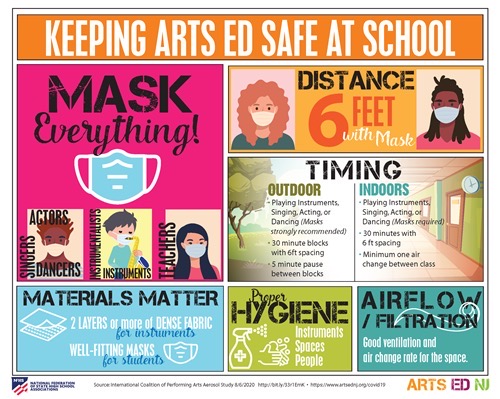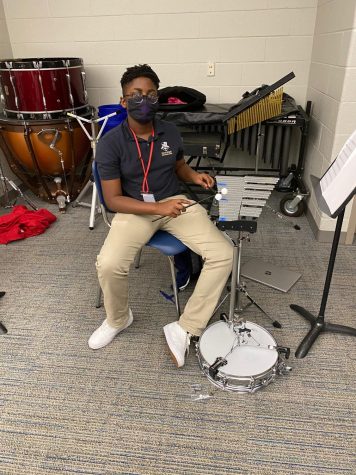When can the arts perform again and what do aerosols have to do with it?

September 24, 2020
When COVID-19 forced the United States and the rest of the world into an unprecedented lockdown this past Spring, many everyday activities came to a grinding halt.
The performing arts at Mount Pisgah have taken a significant hit due to all the newprecautions put in place and, unfortunately, students have been unable to practice and will have to continue this way for the foreseeable future.
We can thank aerosols, which are tiny particles dispersed into the air when people speak, for such a high spread risk of germs. It was reported by the New England Journal of Medicine that traces of COVID-19 can be found in these aerosols floating through the air for up to three hours. This is a big problem for vocalists, wind instrumentalists, and actors.
It is not yet confirmed how wind instrumentalists are able to transmit these particles, but for singers, there are new stories each day about significant numbers of performers getting infected by COVID-19. In March, one Choir in Mount Vernon, Washington, had a rehearsal for two hours after which 52 people became infected.
It has been found that the virus can easily be spread from one person to another by aerosols, specifically through coughing and sneezing as well as talking.
Singers are encouraged to sing from the core and project their voices, creating more of a chance for aerosols to fill the air. The large number of aerosols that singers are able to generate is equivalent to the amount produced when someone coughs or sneezes.
According to Dr. Lucinda Halstead, President of the Performing Arts Medical Association at the University of South Carolina, “there is no safe way for singers to rehearse together until there is a COVID-19 vaccine and a 95% effective treatment in place.”
As of now, very few choirs are able to sing together. Researchers are looking for new ways to be able to do so in the near future.
In addition, studies are also taking place at the University of Colorado, where they are looking at the rates of aerosol accumulation. So far, their results have allowed them only to share some recommendations for singing and playing instruments in the future.
 At Mount Pisgah, the first semester is looking very different for members of the Arts. All performances, including Concert Under the Stars, have been canceled until further notice.
At Mount Pisgah, the first semester is looking very different for members of the Arts. All performances, including Concert Under the Stars, have been canceled until further notice.
Instead of singing for the time being, students in the Mount Pisgah chorus are learning more about choral music education and “will be studying some examples of how music has been a powerful force for good in the lives of marginalized people,” says Chorus Instructor, Audriana Johnson. “I am wanting to take advantage of the opportunity to explore some other elements of choral and music education that I’m not able to get to when we’re under the gun to have a concert ready.”
In the near future, chorus students are planning to follow the guidelines from University of Colorado in the hopes of being able to sing, although the pieces may not be able to be performed. Johnson is looking for places for the chorus to sing outside comfortably.
Band practice is looking different as well. Senior Caroline Izquierdo says her class “has started to do some percussion only pieces, like songs called Bucket O Rocks and Creepy Crawlies because they do not require any air to be blown into the instruments.”
Students are also getting the chance to write their own song to share with their class.
Although these circumstances have made it difficult for groups to come together as they used to, there are many newfound ways to connect with one another that never would have thought of before.

